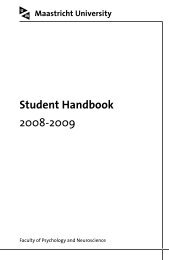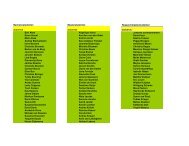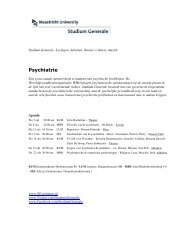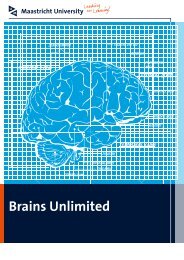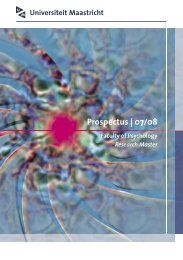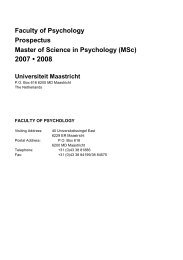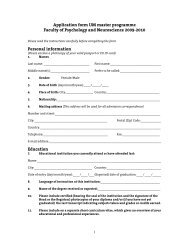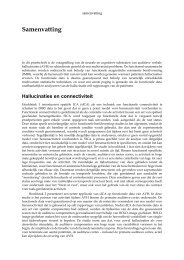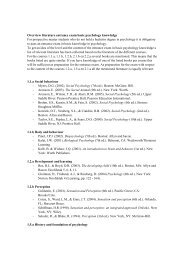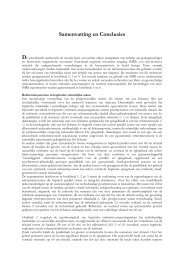Prospectus | 08/09 - Psychology and Neuroscience - Maastricht ...
Prospectus | 08/09 - Psychology and Neuroscience - Maastricht ...
Prospectus | 08/09 - Psychology and Neuroscience - Maastricht ...
Create successful ePaper yourself
Turn your PDF publications into a flip-book with our unique Google optimized e-Paper software.
Chapter 5 - Specialization Psychopathology<br />
Description of the Course<br />
The goal of this training is to acquire basic skills in major peripheral<br />
psychophysiological measures. The relation between cognitive <strong>and</strong> psychophysiological<br />
variables, such as memory load, mental effort, <strong>and</strong> attention, will be made clear. In<br />
addition, general methodological concepts <strong>and</strong> issues, such as tonic (baseline) activity,<br />
phasic activity, <strong>and</strong> the so-called “law of initial value”, will be discussed.<br />
The training consists of four meetings. In the first meeting, an overview will be<br />
presented of the psychophysiological methods that are relevant to neuropsychology.<br />
The second meeting is devoted to major domains in psychophysiology, such as heart<br />
rate (variability), blood pressure, galvanic skin responses, <strong>and</strong> pupillometry (i.e., pupil<br />
dilation). In this meeting, students acquire basic h<strong>and</strong>s-on experience in the laboratory.<br />
The third <strong>and</strong> fourth meeting are practical sessions, in which an existing dataset will be<br />
provided to analyze <strong>and</strong> report on.<br />
107<br />
Instructional Approach<br />
Lecture, demonstrations, <strong>and</strong> practical sessions.<br />
Form of Assessment<br />
Short written research report.<br />
| 486PP Clinical Assessment Instruments – 2 credits<br />
Coordinator: Jill Lobbestael, Clinical Psychological Science (FPN), Phone 38 81611,<br />
50 Universiteitssingel, Room 1.340, E-mail: jill.lobbestael@dmkep.unimaas.nl<br />
Description of the Course<br />
Running parallel to the core seminars throughout year 1, a series of training sessions<br />
will familiarize students with the range of rating scales, questionnaires, <strong>and</strong> interview<br />
instruments most commonly used in clinical practice <strong>and</strong> research. The first session<br />
will provide an overview of the classes of available instruments <strong>and</strong> their applications<br />
in clinical <strong>and</strong> research contexts. Later sessions will focus on instruments designed<br />
to assess specific symptoms <strong>and</strong> severity of the disorders covered in the current<br />
core seminar. The last sessions will focus on broader measures of personality,<br />
psychopathology <strong>and</strong> adjustment (e.g., MMPI, SCL-90, quality of life, social adjustment<br />
<strong>and</strong> coping scales). Working with case materials, students will learn how to choose<br />
appropriate assessment instruments for clarifying individual diagnoses, planning<br />
interventions, <strong>and</strong> monitoring their effects. These training sessions will give students<br />
basic background information <strong>and</strong> h<strong>and</strong>s-on experience in valid <strong>and</strong> reliable<br />
instruments for assessing psychopathology.<br />
Instructional Approach<br />
Group discussions, lectures, demonstrations <strong>and</strong> practical training.



